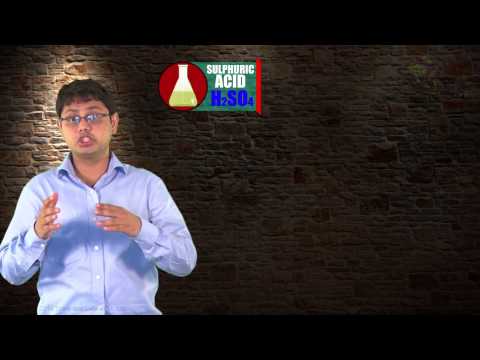Hydrochloric acid is formed when hydrogen chloride gas is mixed with water. This aqueous solution of hydrochloric acid is known as muriatic acid. It is a colourless gas which has a pungent smell. Each molecule of HCl is composed of a one-to-one ratio of hydrogen and chlorine. It is a highly corrosive chemical compound and can be toxic as well.
Hydrochloric acid which is also known as muriatic acid is a poisonous, corrosive hazardous liquid that reacts with most metals to form explosive hydrogen gas and causes severe burns and irritation of the eyes and mucous membranes. It is made by absorbing hydrogen chloride in water. Most acid is the by-product of chlorination. Pure acid is produced by burning chlorine and hydrogen.
Hydrogen acid is available in technical, recovered, food processing and reagent grades. Frequently the commercial grades are slightly yellow as a result of impurities notably dissolved iron. The reagent grade, which normally contains about 37.1% hydrochloric acid, is perfectly clear and colourless.
Table of Contents
- Hydrochloric Acid Uses
- 5 Common Uses of Hydrochloric Acid
- Hydrochloric Acid Uses in Daily Life
- Recommended Videos
- HCl Acid Uses
- Frequently Asked Questions on Uses of Hydrochloric Acid
Hydrochloric Acid Uses
One interesting thing about hydrochloric acid is that our stomachs make this chemical naturally which further helps in the digestion of food. Hydrochloric acid acidifies the stomach contents.
This acid is also found primarily in several industries like rubber, textiles, and even photography. It is also a common item in homes. Industrially, it is used to process steel, in the production of batteries, fireworks and more. The most common uses of hydrochloric acid is mentioned down here:
5 Common Uses of Hydrochloric Acid
- Production of Organic Compounds
- Production of Inorganic Compounds
- Removing metal stains
- Oil production
- Purification of Table Salt, and pH Control
1. Production of Organic Compounds
Hydrochloric acid is used in the production of organic compounds like vinyl chloride and dichloromethane for plastics or PVC (Polyvinyl Chloride), bisphenol A, and many others.
2. Production of Inorganic Compounds
This acid is used to prepare compounds that are used as water treatment chemicals. Some examples include polyaluminium chloride (PAC), iron(III) chloride, and an aluminium carbohydrate which are used in treating the water. It is also used in the regeneration of ion exchange resins and it is specifically used to rinse the cations from the resins.
3. Removing Metal Stains and Cleaning Stone and Tiles
Hydrochloric acid is highly corrosive and because of this nature, it is used as a chemical to remove stains or rust, especially from metals like iron, copper, and others. It is often used in a diluted form. Hydrochloric acid is commonly used for cleaning tiles in kitchens and bathrooms and it also disinfects thoroughly. It is also used in the textile industry for bleaching clothes and processing leather in the leather tanning industry.
4. For Purification of Table Salt and pH Control
This acid is used to purify table salts. Further, HCl is used mostly for regulating the acidity (pH) of solutions and it is used in controlling the pH of pharmaceutical products, foods, and water.
5. For Oil Production
Hydrochloric acid is used in oil production. Generally, hydrochloric acid is injected into a rock and large-pore structures are formed due to the reactions. Now, this significantly assists in oil production.
These are some popular uses of hydrochloric acid. To know more about the properties and structure of acids and bases you can keep visiting BYJU’s or download our app for interesting content and learning experience.
Hydrochloric Acid Uses in Daily Life
Until its many industrial uses were realized, hydrochloric acid was dissolved in liquids and dumped in the sea. Hydrochloric acid is a solution of hydrogen chloride gas in water. Some main industrial uses of hydrochloric acid are cleaning or pickling of metals
- Production of glucose and corn sugar from starch
- Refining of cane sugar
- Making glue and gelatin
- Manufacturing synthetic rubber and plastics
- Purification of common salt
- Manufacture of aqua regia to dissolve noble metals such as gold and platinum.
Recommended Videos

Hydrochloric acid V/s Organic Acids
HCl is the most commonly used acid. It is very corrosive. Organic acids like acetic acid and formic acids are used rarely in the place of HCl though both of them are weaker compared to hydrochloric acid. But acetic acid is stronger than formic acid and can be used as a replacement for hydrochloric acid if necessary. Acetic and formic acids are more commonly used in combination with HCl, HCl-acetic, HCl-formic and formic acetic acid blends exist for high-temperature acidizing applications.
Frequently Asked Questions on Uses of Hydrochloric Acid
What is hydrochloric acid used for?
HCl is used in the production of organic compounds, production of inorganic compounds, removing metal stains, oil production, purification of table salt and pH control.
Is hydrochloric acid dangerous?
Hydrochloric acid is known as a toxic substance. Acidic mist may contain condensed hydrochloric acid, known as hydrochloric acid fumes. Both this mist and the solution have a corrosive effect on human tissue, with the ability to irreversibly damage breathing organs, hair, skin, and intestines.
Is hydrochloric acid a compound?
Yes, hydrochloric acid is a compound. It is formed by the reaction of hydrogen and chlorine. Hydrogen chloride is a gas at atmospheric temperature and pressure. Its aqueous solution is called hydrochloric acid.
Is HCl a volatile acid?
Hydrochloric acid is a volatile substance, and membrane distillation will isolate it from its solutions.
What is another name for hydrochloric acid?
The other names of hydrochloric acid are hydrogen chloride and muriatic acid. HCl is a component of gastric juice.

Comments